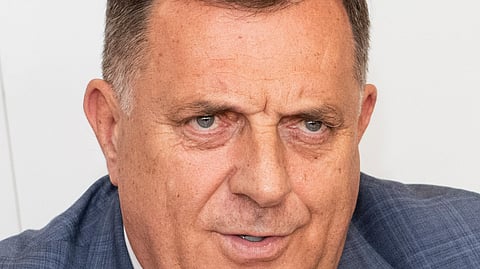

Milorad Dodik, the President of Republika Srpska (RS), warned on Thursday that the Serb-majority entity may have no choice but to declare independence from Bosnia and Herzegovina (BiH) if the current political situation does not change.
Speaking in Budapest alongside Hungarian Foreign Minister Péter Szijjártó, Dodik accused Western institutions—including the European Union and the Office of the High Representative (OHR)—of exerting undue influence and imposing unilateral decisions on Republika Srpska. “If this pressure continues, and if external forces continue to dictate decisions to us, we will be forced to take measures that include declaring independence,” Dodik said.
Dodik has been at the center of escalating tensions between Republika Srpska and the central Bosnian government, a crisis that intensified in February when he was convicted by the Court of Bosnia and Herzegovina for defying the orders of Christian Schmidt, the international High Representative tasked with overseeing the implementation of the 1995 Dayton Peace Accords. His presidential mandate was officially terminated on June 12, 2025, but Dodik has refused to step down, and the RS National Assembly disputes the legitimacy of the decision.
Security forces loyal to Dodik have openly resisted attempts by Bosnian authorities to enforce the court’s ruling, further deepening the political standoff. Last week, Dodik confirmed plans to travel to Moscow to seek Russian President Vladimir Putin’s support for a potential independence referendum.
The situation underscores unresolved ethnic tensions dating back to the Bosnian War of the 1990s, during which the Dayton Accords created a fragile power-sharing arrangement between Bosniaks, Croats, and Serbs. Republika Srpska, which has a Serb-majority population of over 80 percent, has long maintained a strained relationship with Sarajevo, accusing the central government of overreach with the backing of Western powers.
Recently, the RS National Assembly rejected a request from BiH authorities to hold new presidential elections, continuing to recognize Dodik as the legitimate president. Analysts warn that a formal declaration of independence by Republika Srpska could trigger the most serious crisis in the Balkans since the 1990s and potentially risk a return to armed conflict.